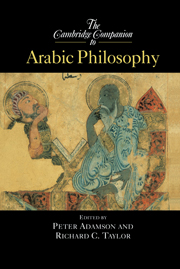Book contents
- Frontmatter
- 1 Introduction
- 2 Greek into Arabic
- 3 Al-Kindī and the reception of Greek philosophy
- 4 Al-Fāarābī and the philosophical curriculum
- 5 The Ismāīlīs
- 6 Avicenna and the Avicennian Tradition
- 7 Al-Ghazālī
- 8 Philosophy in Andalusia
- 9 Averroes
- 10 Suhrawardī and Illuminationism
- 11 Mysticism and philosophy
- 12 Logic
- 13 Ethical and political philosophy
- 14 Natural philosophy
- 15 Psychology
- 16 Metaphysics
- 17 Islamic philosophy and Jewish philosophy
- 18 Arabic into Latin
- 19 Recent trends in Arabic and Persian philosophy
- Select bibliography and further reading
- Index
2 - Greek into Arabic
Published online by Cambridge University Press: 28 May 2006
- Frontmatter
- 1 Introduction
- 2 Greek into Arabic
- 3 Al-Kindī and the reception of Greek philosophy
- 4 Al-Fāarābī and the philosophical curriculum
- 5 The Ismāīlīs
- 6 Avicenna and the Avicennian Tradition
- 7 Al-Ghazālī
- 8 Philosophy in Andalusia
- 9 Averroes
- 10 Suhrawardī and Illuminationism
- 11 Mysticism and philosophy
- 12 Logic
- 13 Ethical and political philosophy
- 14 Natural philosophy
- 15 Psychology
- 16 Metaphysics
- 17 Islamic philosophy and Jewish philosophy
- 18 Arabic into Latin
- 19 Recent trends in Arabic and Persian philosophy
- Select bibliography and further reading
- Index
Summary
SALIENT FEATURES OF LATE ANCIENT PHILOSOPHY
Plotinus: a new reading of Plato
During the imperial age, in many centers of the Roman world, philosophy was taught in close connection to the doctrines of the great philosophers of the past: Plato, Aristotle, Epicurus, Zeno. Not only in Rome, Athens, Alexandria, but also in Pergamon, Smyrna, Apamea, Tarsus, Ege, Aphrodisias in the east of the empire, Naples and Marseille in the west, a “school” of philosophy disseminated either Platonism, Aristotelianism, Stoicism, or Epicureanism. Against this background, the thought of Plotinus represented a turning point in the history of philosophical ideas which was to play a decisive role in the creation of falsafa and to influence indirectly philosophy in the Middle Ages, in both Latin and Arabic.
Coming from Alexandria, where he studied Platonism under the guidance of Ammonius Saccas, Plotinus arrived in Rome (244 C.E.) and opened a school. From his explicit claims, as well as the content of his treatises, we know that he was a Platonist and taught Platonism, but also took into account the doctrines of the other philosophers, especially Aristotle. As we learn from the biography that Porphyry prefaced to the edition of Plotinus’ works, in the daily meetings of the school the treatises of Aristotle, accompanied by their commentaries – especially those by Alexander of Aphrodisias – were read before Plotinus presented his lecture.
- Type
- Chapter
- Information
- The Cambridge Companion to Arabic Philosophy , pp. 10 - 31Publisher: Cambridge University PressPrint publication year: 2004
- 3
- Cited by



